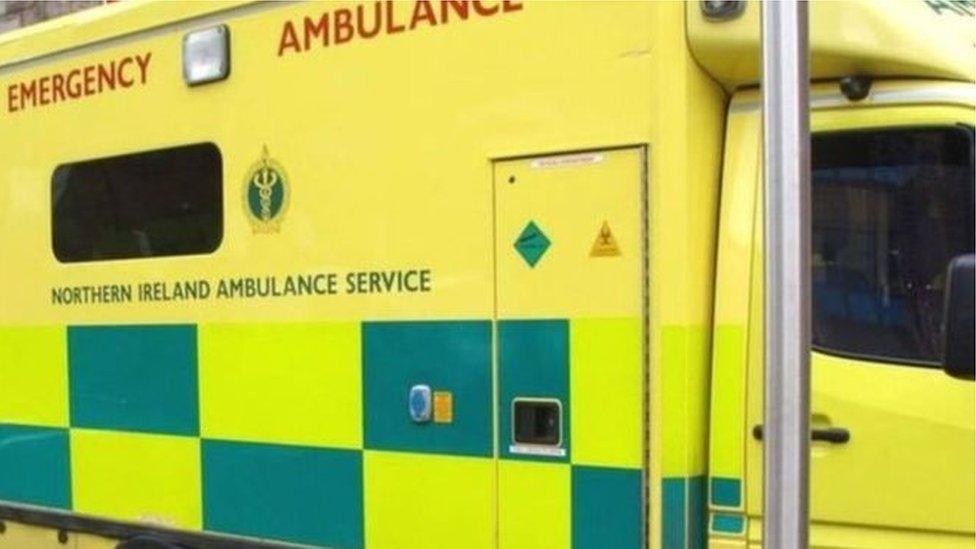NI health crisis: Elderly woman died after six-hour ambulance wait
- Published
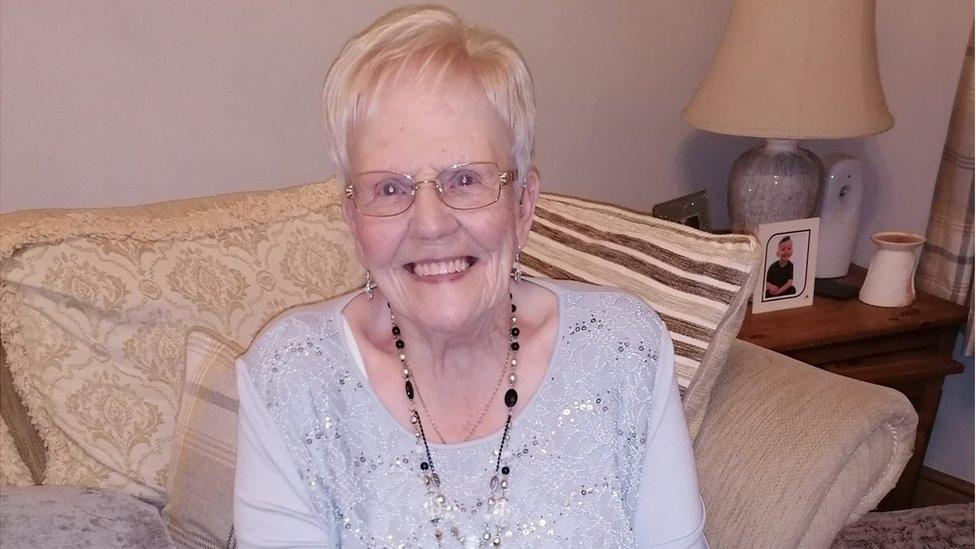
Kathleen Neagle, 89, died at her Dundonald home on 8 July, 2021 - six hours after an ambulance was first called
An 89-year-old woman died at her home after a near six-hour wait for an ambulance, during which paramedics were twice dispatched to her but were diverted to other calls, her family has told BBC News NI.
Kathleen Neagle died on 8 July 2021 in Dundonald, after being ill for a number of days.
Her family said her GP called for an ambulance at about 16:00 BST that day
But none arrived until before 22:00 that evening.
Ambulances dispatched to treat Mrs Neagle were twice diverted to Category One emergency calls.
The initial call for an ambulance was considered a Category Three call and was upgraded to a Category Two later that evening - both are treated less urgently than Category One.
The Northern Ireland Ambulance Service (NIAS) said it deeply regretted any delay in ambulance response.
Mrs Neagle's daughter, Meta Patterson, said she was disgusted at how the system had "failed" her mother.
NI health crisis: Elderly woman died after six-hour ambulance wait
Mrs Patterson said that on 6 July, two days before she died, her mother initially fell ill and attended the Ulster Hospital by ambulance.
She was diagnosed with vomiting and diarrhoea, and was discharged.
However, she deteriorated and, on the afternoon of 8 July, her family contacted Mrs Neagle's doctor, who then requested an ambulance.
At this stage, Mrs Neagle was conscious, but was weak and not eating or drinking.
The ambulance service later called the family at about 18:30 for a condition update.
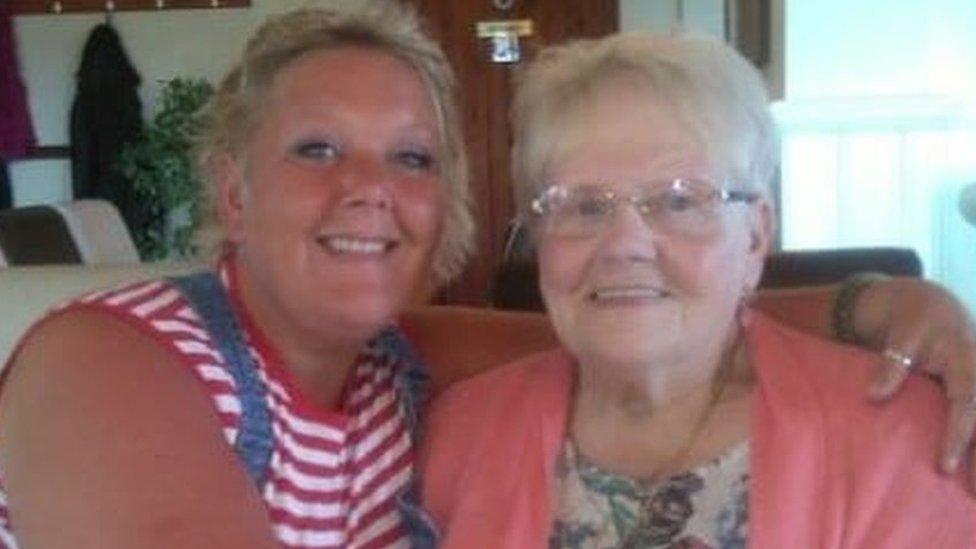
Meta Patterson, Mrs Neagle's daughter, said her mother was failed by the healthcare system
The call handler was told that Mrs Neagle had a rash that would not go away when pressure was placed on it by a glass. It was spreading from her lower limbs over her back, Mrs Patterson said.
She said the ambulance service then said her mother would be treated as a priority.
At about 21:30, a 999 call was made by Mrs Neagle's son, as she had stopped breathing, Mrs Patterson said.
She said the dispatcher remained on the phone as CPR was performed for about 20 minutes, until two police officers arrived at the house to assist.
"And then the young ambulance driver came in at 10pm, when she was dead," Mrs Patterson said.
"He didn't even realise what he was coming in to.
"It sounds terrible. I know people would say she was 89, but she was a fit 89-year-old. She didn't have ongoing problems that would cause that."
Mrs Patterson said her mother died of heart failure.
Mrs Neagle's case has come to light after it emerged that a 39-year-old woman who died in Newry, County Down, had been waiting for paramedics from Belfast due to a shortage of crews in the Southern Health Trust area.
Mrs Patterson said that when the ambulance eventually arrived at her mother's house, the paramedic said he had come from Ballynahinch.
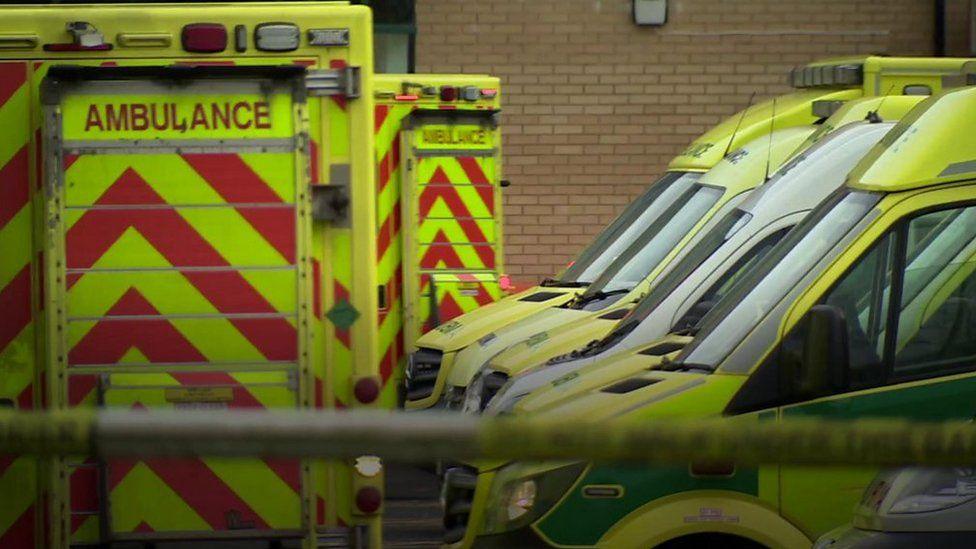
"That night I shouted at the ambulance driver when he said he was sorry," Mrs Patterson said.
"I said: 'No, you had told me she was going to be fine. You should have been here.'
"And that fella just stood there and said: 'There was no one available, I had to come from Ballynahinch.'
"You're talking about 40 minutes away."
Mrs Patterson said the Ulster Hospital was "five minutes away but we couldn't take her because she was so bad".
'Failed my mother'
She said the ambulance service later carried out an inquiry into the case - a Significant Event Audit - during which it came to light that two ambulances had been dispatched to her mother that evening, but both had been diverted to Category One emergency calls.
It stated that the initial ambulance request from Mrs Neagle's doctor was a Category Three call, later updated to a Category Two at 18:24.
The call was then further upgraded at 21:31, when Mrs Neagle had stopped breathing.
The audit stated that on that date the ambulance service was under extreme pressure.
It said there were no A&E vehicles available in the area due to crew shortages and long handovers at hospitals.
Mrs Patterson said she did not blame the ambulance service, but the system.
"I was totally disgusted. I just felt they failed my mother," Mrs Patterson said.
"My mum should not have died.
"The ambulance drivers are being put in a position and they get so much abuse. I think the system has failed."
The Neagle family wrote to Health Minister Robin Swann in February after a meeting they had with the NIAS.
In their letter, they praised ambulance service staff, saying they "performed their tasks with efficiency, sensitivity and care, during a traumatic situation" and appealed to the minister to take action.
A spokesperson for the minister confirmed the department received correspondence, and a reply was sent a number of days later.
NIAS, in a statement, said concerns relating to any aspect of provision of service are reviewed internally "through the appropriate processes within NIAS, and we respond and engage directly with the patient and/or their families and carers".
"Such delays are not the service the public expect and deserve, nor one that we seek to provide and we would apologise unreservedly for any such delay," it said.
"We wish to express our sincere condolences to Mrs Neagle's family on their loss. We have engaged directly with family members during the review of the circumstances which led to the delayed response.
"We would of course be happy to engage further if the family felt this would be helpful, however do not feel it appropriate to comment further."
'Nothing held her back'
Mrs Patterson said her mother had not been unwell in the days before her death.
She said she had been at her church the previous Sunday, four days before she died.
"She had problems with her leg, and a bit of arthritis in the knee, but other than that she was up getting her hair and her nails done, going to her church," Mrs Patterson said.
"She had a friend called Vivienne who took her everywhere and she went with her walking stick for her knee. She loved her clothes, loved getting out, having a laugh.
"She just loved her family around her and getting everywhere.
"Nothing held her back."
Related topics
- Published12 April 2022
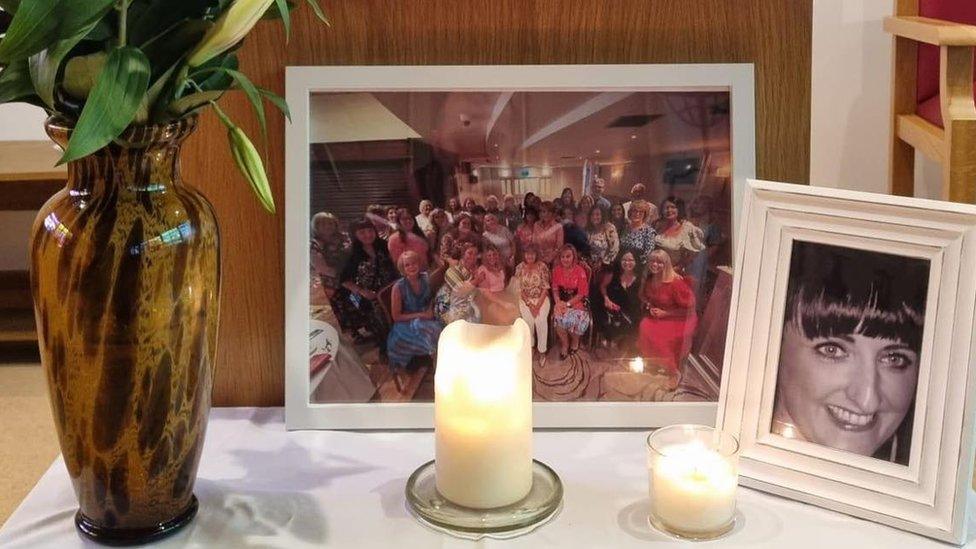
- Published11 April 2022
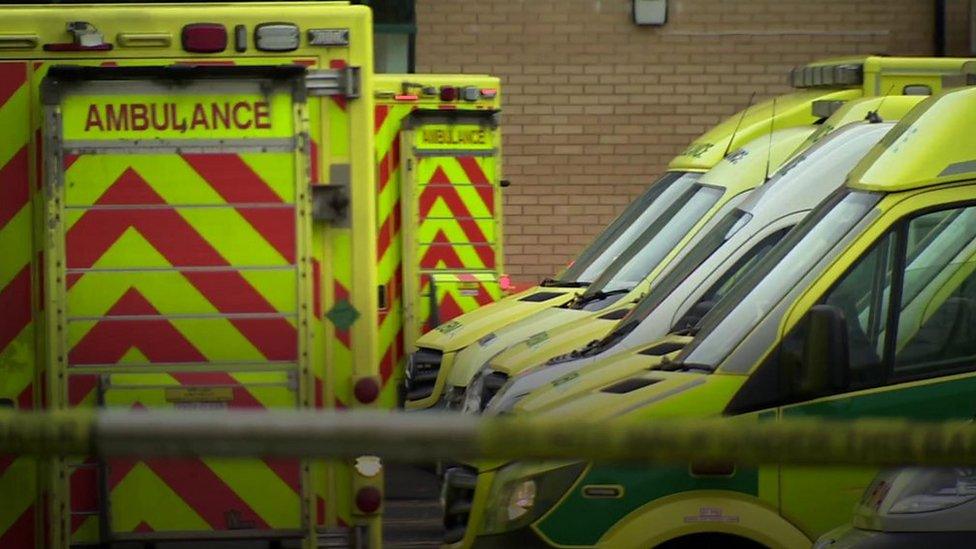
- Published6 April 2022
